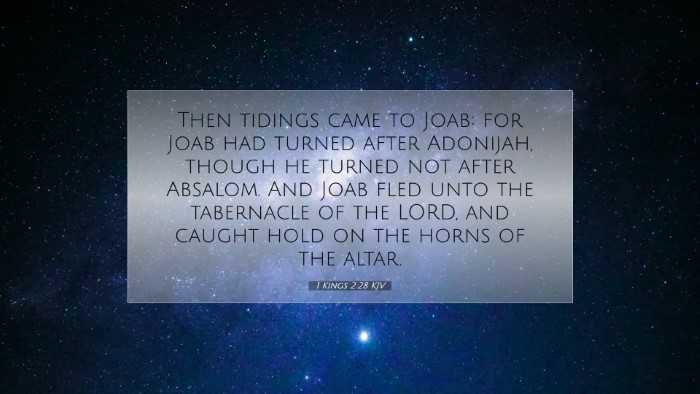1 Kings 2:28 - Commentary Overview
Verse Reference: 1 Kings 2:28 (KJV) - "Then tidings came to Joab; for Joab had turned after Adonijah, though he turned not after Absalom."
Contextual Background
The narrative surrounding 1 Kings 2:28 occurs during a transitional period in Israel's monarchy, with King David nearing the end of his reign. Solomon is established as King, but the power dynamics are tumultuous as rival factions vie for influence. Joab, the former commander of David's army, finds himself in a precarious position due to his allegiance shifting towards Adonijah, another claimant to the throne.
Commentary Insights
Matthew Henry's Commentary
Matthew Henry emphasizes Joab's history of treachery and his often questionable loyalties. He notes that Joab's turning after Adonijah signifies his continual ambition and disregard for the rightful authority as appointed by God. Henry highlights that Joab's loyalty to David was secondary to his personal ambition, and this allegiance ultimately led to his downfall.
Albert Barnes' Commentary
Albert Barnes dives deeper into the implications of Joab’s decisions. He points out that Joab had a reputation for being both a strategist and a warrior; however, his political choices became increasingly reckless. Barnes interprets Joab's actions as a miscalculation of the political landscape that Solomon was now in charge of. The king's commitment to justice and divine order would not accommodate Joab’s lingering tendencies towards rebellion.
Adam Clarke's Commentary
Adam Clarke provides a thorough analysis of the motivations behind Joab's actions. He argues that Joab’s past experiences with previous rebellions flushed out his disloyalty and pragmatic approach to power. Clarke also mentions that Joab's choice to support Adonijah may have stemmed from a belief that he could manipulate the emerging situation to his advantage. Ultimately, Clarke portrays Joab as a tragic figure, whose flawed judgment led to grave consequences.
Theological Implications
This verse serves as a potent reminder of the themes of loyalty and divine authority. The tension between human ambition and God’s ordination of leadership is palpable in Joab’s actions. It challenges readers to consider their allegiances and the implications of turning away from divinely appointed authorities.
Lessons for Pastors and Theologians
- The Danger of Ambition: Joab’s ambition led to betrayal. Pastors must be wary of the nuanced temptations that come with leadership.
- Faithfulness to God’s Plan: Leaders should remain aligned with God’s plan and purposes rather than personal gains.
- Consequences of Allegiance: The choice of whom to support can have lasting repercussions. Understanding this can guide leaders in their ministry choices.
Application for Modern Readers
In contemporary contexts, where authority is often challenged, this verse can prompt self-reflection on loyalty and commitment to Godly leadership. While the political landscape might be different, the principles of allegiance, ambition, and divine purpose are ever-relevant. Believers are called to evaluate their loyalties and ensure that they support those leaders who uphold righteousness and justice according to divine standards.
Conclusion
The episode surrounding Joab's actions as detailed in 1 Kings 2:28 is a gripping illustration of the complexities of loyalty, power, and the fulfillment of God's divine will. The insights gleaned from public domain commentaries underscore the need for careful navigation through the turbulent waters of leadership and ambition, with a strong emphasis on fidelity to God's appointed direction.


